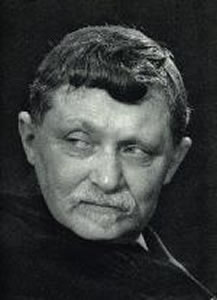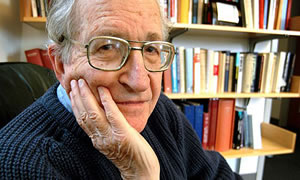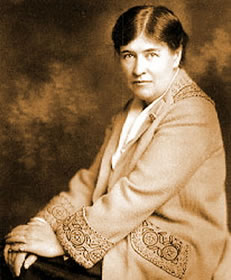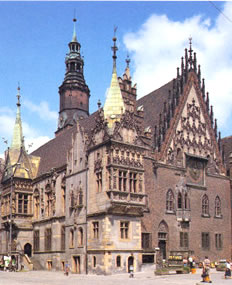|
De Franse filosoof en toneelauteur Gabriel Marcel werd geboren op 7 december 1889 in Parijs. Zie ook alle tags voor Gabriel Marcel op dit blog.xml:namespace prefix = o ns = "urn:schemas-microsoft-com:office:office" />
Uit: Awakenings (Vertaald door Peter S. Rogers)
This summer day of 1899 was a terrible date in the life of a child, as I learned that we were going to leave Stockholm and return to Paris. How can I ever forget the heavy heart with which I received this news? As my father suffered somewhat from the Swedish climate and didn't much care for the worldly and formal aspects of diplomatic life, he was going to switch positions with a senior member of the Council of State, Monsieur Catusse. This meant first of all that I could no longer hope to spend vacation in Finland or in Norway. What may seem peculiar is that nothing, or almost nothing, attracted
me in the Paris where we were to settle definitively. I also felt that our return would be, sooner or later, followed by my entrance into the lycée, something I vaguely feared since, until then, I had been edu-
cated at home. I can't recall whether it was immediately before or after our stay in Stockholm that, for some months, I attended classes at Rue Royale where my fellow students were mainly young girls.
What had I most appreciated in the Swedish capital? Without hesitation I would say the landscapes. I remember a discussion with my father on the topic during a boat ride on the Saltsjön. He was essen-
tially a man of the Midi, the French South, and this somewhat uniform and sad nature bored him. Yet there was something in it that exalted me. But what words could I use to translate that emotion?
I must have expressed myself rather awkwardly. But when I think about what I had lived during that year in Stockholm, I see this: it was as though I had been removed from the humdrum life I was to
suffer from so much later on, by the fact of being far away, and on the edge of countries that were still farther away and which attracted me.

Gabriel Marcel (7 december 1889 - 8 oktober 1973)
De Amerikaanse taalkundige, mediacriticus en anarchistisch denker Noam Chomsky werd geboren in Philadelphia op 7 december 1928. Zie ook mijn blog van 7 december 2007 en ook mijn blog van 7 december 2008 en ook mijn blog van 7 december 2009 en ook mijn blog van 7 december 2010.
Uit: Chronicles of Dissent, 1992
QUESTION: One of your books, The Fateful Triangle, focuses specifically on the Middle East, and I was wondering if you could talk about your position on a possible two-state solution to the Palestinian question.
CHOMSKY: I don't think that's the optimal solution, but it has been the realistic political settlement for some time. We have to begin with some fundamentals here. The real question is: there are plainly two national groups that claim the right of self-determination in what used to be Palestine, roughly the area now occupied by Israel minus the Golan Heights, which is part of Syria.
So there are two national groups which claim national self-determination. One group is the indigenous population, or what's left of it -- a lot of it's been expelled or driven out or fled. The other group is the Jewish settlers who came in, originally from Europe, later from other parts of the Middle East and some other places. So there are two groups, the indigenous population and the immigrants and their descendants. Both claim the right of national self-determination. Here we have to make a crucial decision: are we racists or aren't we? If we're not racists, then the indigenous population has the same rights of self-determination as the settlers who replaced them. Some might claim more, but let's say at least as much right. Hence if we are not racist, we will try to press for a solution which accords them -- we'll say they are human beings with equal rights, therefore they both merit the claim to national self-determination. I'm granting that the settlers have the same rights as the indigenous population; many do not find that obvious but let's grant it. Then there are a number of possibilities. One possibility is a democratic secular society. Virtually nobody is in favor of that. Some people say they are, but if you look closely they're not really. There are various models for multi-ethnic societies, say Switzerland or whatever. And maybe in the long run these might be the best idea, but they're unrealistic.

Noam Chomsky (Philadelphia, 7 december 1928)
De Amerikaanse schrijfster Willa Cather werd geboren op 7 december 1873 in de buurt van Winchester, Virginia. Zie ook mijn blog van 7 december 2006 en ook mijn blog van 7 december 2009 ook mijn blog van 7 december 2010.
Uit: The Song of the Lark
"She was getting back to the earliest source of gladness that she could remember. She had loved the sun, and the brilliant solitudes of sand and sun, long before these other things had come along to fasten themseves upon her and torment her. That night, when she clambered into her big German feather bed, she felt completely released from the enslaving desire to get on in the world. Darkness had once again the sweet wonder that it had in childhood...
(...)
"She used to wonder at her own inactivity. She could lie there hour after hour in the sun and listen to the strident whirr of the big locusts, and to the light, ironical laughter of the quaking asps. All her life she had been hurrying and sputtering, as if she had been born behind time and had been trying to catch up. Now, she reflected...it was as if she were waiting for something to catch up with her. She had got to a place where she was out of the stream of meaningless activity and undirected effort.
(...)
"Here she could lie for half a day undistracted, holding pleasant and incomplete conceptions in her mind--almost in her hands. They were scarcely clear enough to be called ideas. They had something to do with fragrance and color and sound, but almost nothing to do with words. She was singing very little now, but a song would go through her head all morning, as a spring keeps welling up, and it was a pleasant sensation indefinitely prolonged. It was much more like a sensation than like an idea, or an act of remembering. Music had never before come to her in that sensuous form. It had always been a thing to be struggled with, had always brought anxiety and exaltation and chagrin--never content and indolence."

Willa Cather (7 december 1873 24 april 1947)
De Duitse dichter Samuel Gottlieb Bürde werd geboren op 7 december 1753 in Breslau. Zie ook mijn blog van 7 december 2010.
Geist der Wahrheit, lehre mich
Geist der Wahrheit, lehre mich
aller Weisheit Quelle kennen!
Jesum kann ich nur durch dich
meinen Herrn und Heiland nennen.
Du nur kannst ihn mir verklären
und mein Herz in Gott belehren.
Du nur machst das Herz gewiß
und erleuchtest meine Seele,
daß ich in der Finsterniß
nicht den Weg des Heils verfehle.
Du nur führst auf Gottes Pfaden,
zeugst von Wahrheit und von Gnaden.
Heiligung und Reinigkeit
und ein gottgefällig Leben,
selige Zufriedenheit,
wahre Weisheit kannst du geben.
Selig, die an deinen Gaben
theil durch Lieb und Glauben haben.
Was mir fehlt, find ich in dir,
nur durch dich kann ich genesen.
Mache Wohnung ganz in mir,
daß werd neu mein ganzes Wesen!
Dann wird meine Schwachheit Stärke
und ich wirke Gottes Werke.

Samuel Gottlieb Bürde (7 december 1753 - 28 april 1831)
Breslau, raadhuis (Geen portret beschikbaar)
|



